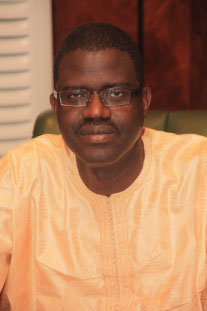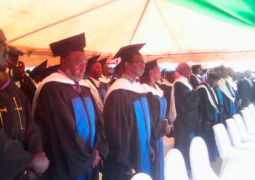
Continuing his evidence-in-chief, Bah told the court that he knew Jainaba Jobarteh from the Ministry of Foreign Affairs at the time, like any civil servant working in the service.
Jainaba Jobarteh was part of the delegation that accompanied the President to Ethiopia in 2012; he also got to know her through a ceremony in 2012 when she was an interpreter at the ceremony of laying the foundation stone for the new Ministry of Foreign Affairs office building to be constructed near Arch 22 in Banjul.
Jainaba was the one who interpreted for the Moroccan delegation from French to English, he said.
Bah also told the court that he could recall receiving a file from Dawda Fadera, the permanent secretary at the Personal Management Office (PMO).
“When I saw the minutes on the proposal from the Ministry of Foreign Affairs for the posting of Jainaba Jobarteh to the UN Mission in New York, and that in the minutes the permanent secretary supported the posting of Jainaba, I endorsed it,” he said.
He said he went through the file as secretary general and head of the civil service, and knew that the file was vetted; that it went through due process like any other file he used to receive.
He added that as secretary general and head of the civil service, it was his responsibility to support any movement that he believed would enhance the capacity of the civil service and also of benefit to the Gambia government.
It was also part of his mandate as secretary general and head of the civil service to ensure the smooth functioning of the civil service in the country, he further stated.
“I believe that before, and even now, that Jainaba was qualified for that posting at the UN Mission in New York, and by going through the file before me she was qualified for the position,” Ngoju Bah told the court.
He said the staff in New York needed to be enhanced, and having somebody there who was bilingual and experienced could not be seen as abuse of his office as Secretary General and Head of the Civil Service.
Bah added that as head of the civil service, he knew Jainaba Jobarteh was experienced, because she holds a Master’s degree in a related field, and he was convinced that posting her to the UN mission would be added advantage for The Gambia.
“I then endorsed the recommendation, and I returned the file to Dawda Fadera, and the file was available,” he told the court.
The file he received was from the permanent secretary, Dawda Fadera, concerning the proposal from the Ministry of Foreign Affairs and that was the practice in the past, he said, adding this has been buttressed by the permanent secretary in his evidence-in-chief.
He said as secretary general and head of the civil service, he knew they do have a manual and, if he could see the manual, would be able to identify it.
“This manual is available in all our offices, not only for me as secretary general; even the permanent secretaries are having it in their offices,” Bah informed the court.
At that juncture, the defence counsel applied to tender the manual for evidence purposes.
However, the state counsel, Mansour Jobe, objected on the grounds that the document was not from proper custody, and so it was not a proper document.
The defence counsel also applied to tender the statement of Jainaba Jobarteh, but that also created a lot of debate between the defence counsel and state prosecutor.
The case was then adjourned to 23 December 2014, for a ruling and continuation of the hearing.


